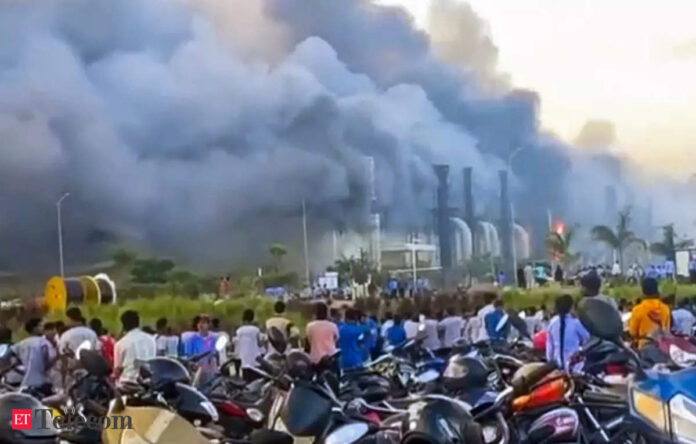In Short:
The ongoing Iran-Israel conflict poses serious risks to India’s micro, small, and medium enterprises (MSMEs), which contribute significantly to exports and GDP. Disruptions in supply chains and rising costs, especially in the automotive and textile sectors, could damage these businesses. Higher freight and insurance costs are expected, and many MSMEs have already reported cancellations in orders, further straining this vital sector.
Impact of Iran-Israel Conflict on India’s MSMEs: A Clarion Call for Attention
New Delhi: As tensions escalate in the Iran-Israel conflict, India’s micro, small, and medium enterprises (MSMEs) are bracing for what experts predict could be an even tougher road ahead. These enterprises, already facing various challenges, may find themselves under increasing strain.
MSMEs: The Backbone of India’s Economy
MSMEs play a vital role in India’s economic fabric, representing a wide range of sectors, from textiles and handicrafts to automotive components. They contribute significantly to India’s global trade network, making any disruptions in their operations matters of concern.
Supply Chain Woes
With the unrest in West Asia, particularly affecting key routes like the Strait of Hormuz and the Chabahar port, supply chains are at risk. An increase in freight costs is looming, potentially squeezing MSME exporters even tighter.
Government data highlights that MSMEs account for nearly 45% of India’s total exports, making these developments critical to monitor.
Concerns from Industry Leaders
“The ongoing Iran-Israel conflict poses significant risks to the automotive sector, particularly concerning raw materials and components sourced from the Middle East,” said Veer Singh, CEO of Lord’s Automotive, in an interview with Mint. “As many financial institutions are interconnected with this region, disruptions could lead to funding shortages for numerous startups reliant on Middle Eastern investments.”
Singh emphasized that this stagnation in financial flows could hinder growth, dampen revenue prospects, and hike operational expenses for emerging businesses in the automotive sector. As geopolitical tensions mount, vulnerabilities in the supply chain may become more pronounced, potentially impacting production timelines and costs.
The Economic Footprint of MSMEs
According to the Economic Survey 2024, MSMEs contribute around 30% to India’s GDP and employ over 11 crore people, with their output accounting for 35.4% of manufacturing in the country.
Positive indicators show that gross value added (GVA) per worker has risen from $1,652.56 to $1,695.15, while the gross value of output (GVO) per establishment has increased from $4,762.58 to $5,540.81. This reflects enhanced productivity and labor efficiency within the sector.
The Ripple Effects of Disruptions
Professor Ram Singh from the Indian Institute of Foreign Trade warns, “Our trade with Europe and Russia would suffer badly, and key air routes could be disrupted, significantly impacting exports of textiles, electronic goods, gems and jewellery, pharmaceuticals, and agricultural products.”
Bookings Hit Hard
Concerns are mounting as confirmed bookings from August and September are being cancelled, according to a Gurugram-based textiles exporter who requested anonymity. “The export of textile products to Iran and other Middle Eastern countries relies heavily on Turkey, and due to the ongoing disturbances, the textiles trade is significantly impacted,” they noted.
The textiles sector has already seen a decline, with exports dropping by 3.23% to $34.40 billion in FY24, compared to $35.55 billion in FY23, and a peak of $41.12 billion in FY22.
Voices of Concern from MSME Leaders
Arun Kumar Garodia, chairman of the Engineering Exports Promotion Council, stated, “When all the big players are under stress, the MSME sector is no exception. We are keenly assessing the damage that the industry will face from the disturbances in West Asia.”
Mukesh Mohan Gupta, president of the Chamber of Indian Micro, Small, and Medium Enterprises, echoed similar sentiments, asserting that any disturbances would undoubtedly impact MSME units. “If tensions escalate to the next level, the effects will be significant,” he predicted.
Gupta raised a crucial point: “Even if some MSME units are not directly engaged in exporting specific goods, the stress experienced by larger companies will inevitably trickle down to smaller and medium manufacturing units.”
Government Response
Amid pressing challenges, the government is stepping up to support MSMEs. In the recent Union Budget for 2024-25, finance minister Nirmala Sitharaman announced several key measures aimed at bolstering this vital sector.
These initiatives include a credit guarantee scheme of up to ₹100 crore for capital investments in machinery, the development of in-house credit assessment models by public sector banks, and a government-backed fund to offer financial support during stressful periods.
Other notable measures involve raising Mudra loan limits to ₹20 lakh, expanding mandatory onboarding on the TReDS platform, opening new SIDBI branches in MSME clusters, and providing financial resources for establishing food irradiation units and safety labs.
In a recent Lok Sabha session, minister Jitan Ram Majhi revealed that out of the million registered MSMEs, 49,342 have unfortunately closed down, leading to the loss of 317,641 jobs.
The data indicates that Maharashtra faced the highest closures with 12,233 MSMEs shutting down and resulting in 54,053 job losses. Following close behind were Tamil Nadu with 6,298 closures, Uttar Pradesh with 3,425, Gujarat with 4,861, and Bihar with 2,414.





